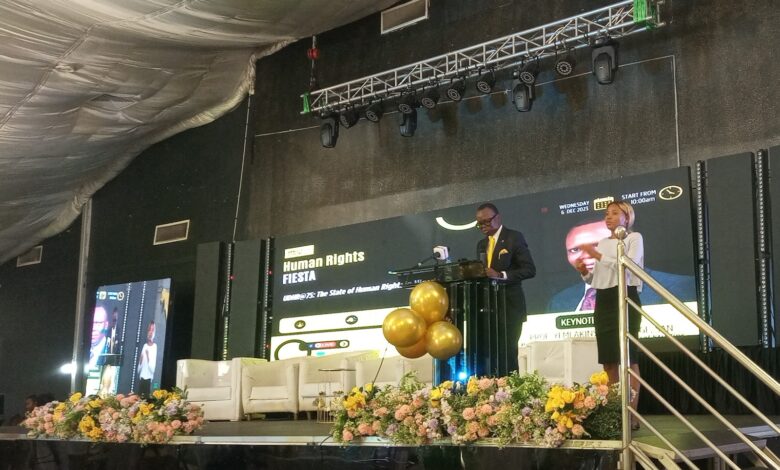Failure To Address Human Rights Abuses Emboldening Impunity In Nigeria — Amnesty International
Before 1948, Nigeria was under the dominance of the British colonial administration, whose focus was on the extraction of natural resources from the colony with no policy to protect individual rights.

Amnesty International, a group advocating for justice, freedom and equality, has tasked the Nigerian government to address past and current human rights abuses in the country.
At a conference held on Dec. 6 in Abuja, Nigeria’s capital city, and themed “Write For Rights Fiesta Agenda 2023”, the global human rights group addressed the unending issues of human rights abuses, especially by people in the country’s corridors of power.
Isa Sanusi, the organisation’s Country Director, said the campaign aims to ensure that “our world and lives are better” as humans.
“We want to ensure that no one can violate your rights and get away with it,” Sanusi said in his welcome address. “We want a country where there is no discrimination and where the rule of law is supreme.”
Sanusi noted that the campaign was organised to celebrate International Human Rights Day and to encourage people to write empathetic and supportive messages to people suffering injustice around the world.
“Consistent failure to address past and current human rights abuses is emboldening impunity,” he declared. “The recent air strike in a Kaduna village is another eye-opener escalating the disregard for the sanctity of human life.”
However, the keynote speaker at the conference, Yemi Akinseye-George, a Senior Advocate of Nigeria (SAN), reminisced about the history of human rights in Nigeria before 1948 vis-a-vis its development and challenges.
In his keynote speech, titled “The State of Human Rights in Nigeria”, the renowned lawyer and professor commended the annual celebration of the Universal Declaration of Human Rights (UDHR), a global road map for freedom and equality protecting the rights of every individual.
“Before the return of Nigeria to civil rule in 1999, the country recorded an upsurge in human rights activism. The various human rights organisations such as the Civil Liberties Organization (CLO), Constitutional Rights Project (CRP), Media Rights Agenda (MRA), and others were very active in promoting and defending human rights in the country,” Akinseye-George recalled.
“But since 1999, there appears to have been a significant decline in human rights activism in the country.
Before 1948, the keynote speaker said, Nigeria was under the dominance of the British colonial administration, whose focus was on the extraction of natural resources from the colony with no policy to protect individual rights. He explained that the policy of Indirect Rule was introduced by them to take effective control of the land and resources of the indigenous people.
“Corruption, violation of human rights and other abuses unknown to indigenous communities were tolerated by the colonialists as long as the local authorities fulfilled the expectations of the colonial masters,” he said, recounting how the colonial masters used lethal force to respond to women demanding justice in a Nigerian village, killing a number of them.
He stated many feats of the UDHR since it was adopted in 1948, which include inspiring numerous international treaties and conventions that formed the basis for legal frameworks globally. He also noted its influence on African countries and the significant waves of change it has achieved in the continent, especially in Nigeria.
“Notwithstanding the numerous benefits of UDHR, Nigeria is still beset by a host of problems which continue to hinder the realisation of the vision of the UDHR in the country,” he said and noted that the high population of people in Nigeria suffering from poverty is greatly affecting the execution of their basic human rights.
He also said constant corruption and abuse of office undermine the rule of law, impede justice, and lead to a growing culture of impunity that often leaves the perpetrators of human rights abuses unpunished in Nigeria.
Citing the story of Deborah Samuel, a student accused of blasphemy and stoned to death by her fellows, he said ethnicity and religious bigotry have led to unequal treatment and rights violations for certain groups.
Socio-cultural practices such as Female Genital Mutilation (FGM), Sex and Gender Based Violence (SGBV), Discrimination Against Girl Children, Child Marriage, Forced Prostitution, and Child Labor are common in Nigeria and denigrating rights and dignities, he said,
He added that events leading to the EndSARS protests and the mass shootings that occurred afterwards are another limitation to the implementation of human rights in Nigeria.
However, the professor identified factors that can promote the efficient implementation of human rights in Nigeria, including strengthening the media space, improving the government’s commitments to protecting human rights, revamping civil society activism and so on.
Support Our Journalism
There are millions of ordinary people affected by conflict in Africa whose stories are missing in the mainstream media. HumAngle is determined to tell those challenging and under-reported stories, hoping that the people impacted by these conflicts will find the safety and security they deserve.
To ensure that we continue to provide public service coverage, we have a small favour to ask you. We want you to be part of our journalistic endeavour by contributing a token to us.
Your donation will further promote a robust, free, and independent media.
Donate HereStay Closer To The Stories That Matter




